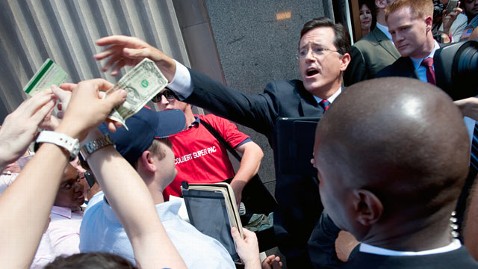A Stephen Colbert Write-In Campaign in S.C.? Not So Fast.

Sarah L. Voisin/The Washington Post/Getty Images
As comedian Stephen Colbert's superPAC preps for his potential run for "President of the United States of South Carolina" by buying up ad time in the Palmetto state, there's a problem that's emerged in his plan. South Carolina doesn't allow write-ins in its presidential primary.
As ABC News reported last night, the filing deadline to appear on the ballot in South Carolina's upcoming Republican primary has come and gone. Candidates who did not pay the $35,000 filing fee by Nov. 1, 2011 will not appear on the state's ballot. A sample ballot on the State Election Commission's website shows nine options for voters, and that's all.
For anyone thinking "well, someone could still technically write-in Mr. Colbert's name on a ballot" - think again. South Carolina uses something called direct recording electronic voting machines in all 46 counties. The South Carolina State Election Commission describes how these machines work on their webpage.
"The voter makes his/her selections by pressing a button beside a party, candidate or issue displayed on the direct recording electronic (DRE) voting machine. After all selections have been made, the voter presses a VOTE button to cast his/her ballot."
The only place where someone could conceivably write-in a vote for Colbert is on an absentee ballot, which are still being sent out as requested. However, those ballot would not be counted by the state.
Matt Moore, a spokesman for the South Carolina Republican Party, sent ABC News a statement firmly dismissing Colbert's so-called announcement.
"South Carolina state law does not allow write-in ballots in presidential primaries. There is no 'blank' space on voting machines to write-in a candidate" writes Moore. "Stephen Colbert has about as much a chance at being elected President in South Carolina as he does of being elected Pope. Zero. It didn't work four years ago, and it won't work now. The gag is worn out."
Meanwhile, Colbert is continuing to draw attention to what he believes to be the absurdities of campaign finance law after the Citizens United ruling. NBC released a clip of an upcoming interview with Colbert, conducted by Ted Koppel.
The clip shows Koppel asking Colbert "what is the difference, Stephen, between a PAC and a superPAC?"
"Well, it gets technical, but, without going into too much detail, one of them has the word "super" in front of it and that makes it a superPAC " Colbert replies.
"Other than that, as far as I can tell the difference between a PAC and a superPAC is a cover letter, because I formed a PAC, but a PAC can only take so much money, it can only spend so much money, and I wanted to spend unlimited amounts of money, and receive, more importantly, unlimited amounts of money. So my lawyer told me all I had to do was add a cover letter that said 'I intend this to be a super PAC, and it was a superPAC."